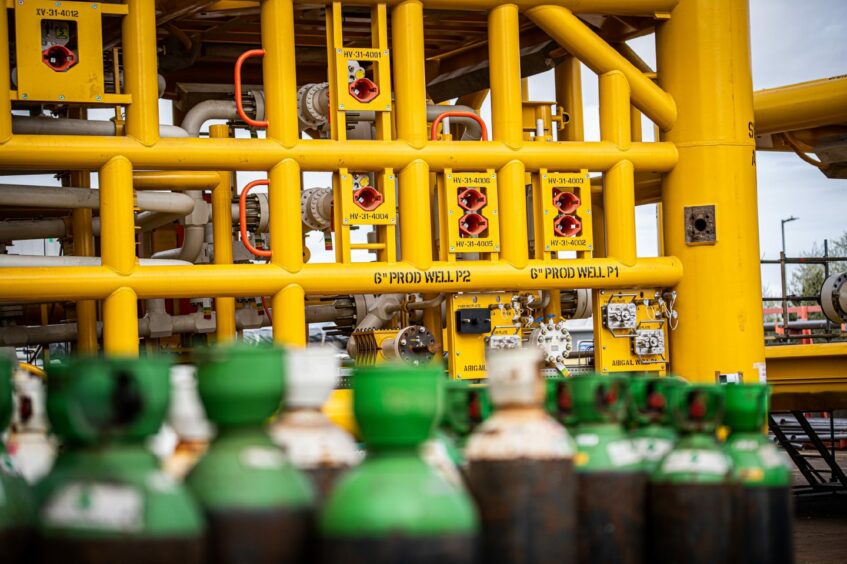Another North Sea oil and gas producer has announced a huge jump in profits, adding further fuel to the debate about energy prices.
Ithaca Energy’s bumper figures for the first half of 2022 follow similar strong performances by the likes of BP, Shell and Harbour Energy.
Operators are reaping the benefits of higher commodity prices and a squeeze on global supplies, exacerbated by the war in Ukraine affecting exports from Russia.
Their increased earnings are helping to secure and create jobs in the north-east, supporting the local economy through challenging times.
Growing anger over bills
But they are also fuelling growing anger among consumers and businesses who are suffering massive increases in their energy bills.
There is growing pressure on the government to step in for the second time this year as electricity and gas costs rocket.
Leeds East MP Richard Burgon said today he planned to present a petition to parliament, calling for more taxation for North Sea firms.
A windfall tax on the offshore oil and gas industry was introduced by the UK Government in May.
It is raising billions of pounds for the Treasury to partly fund a range of cost-of-living measures.
The levy – a 25% surcharge on the large profits the sector is making – is also driving investment in future exploration and development, as well as renewables projects.
This because firms can take advantage of an offsetting tax relief that was introduced as part of the windfall tax package.
The measures are temporary and will be phased out when commodity prices return to historically more normal levels. There is also a “sunset clause” which will remove the levy after December 31 2025.
Ithaca – whose operated assets include the Captain field, about 90 miles north-east of Aberdeen, in the outer Moray Firth, and Greater Stella Area production hub – reported pre-tax profits of nearly £1.5 billion for the first six months of 2022, up from £213.4 million a year ago.
Revenue soared to £1.16bn in the latest period, from £541.5m previously.
First half profits were boosted by two acquisitions, Summit Exploration & Production (E&P) and Siccar Point Energy, in the second quarter.
The acquisition of Summit E&P increased Ithaca’s interest in Elgin Franklin from 3.9% to 6.1%, while Siccar Point Energy gave the firm stakes in four of the UK’s largest oil and gasfields – Schiehallion (11.8%), Mariner (8.9%), Rosebank (20%) and Cambo (70%).
As well as energy firms being brought into public ownership and prices frozen, the Windfall Tax must be hiked so oil & gas firms don't make a SINGLE PENNY in excess profits from this crisis.
Next week I'm presenting this petition in Parliament. Sign here:https://t.co/oRfq9AsRib pic.twitter.com/joJ7etVTpP
— Richard Burgon MP (@RichardBurgon) August 30, 2022
Ithaca’s accounts also reveal a £565m, non-taxable “negative goodwill” boost to Ithaca from the Siccar Point deal.
This is for tax “assets” Aberdeen-based Siccar Point was unable to take advantage of – but Ithaca can.
Ithaca’s figures show deferred tax assets – effectively taxation credits – worth a total of more than £1.7bn, offset by a deferred tax liability of £577.6m.
Flotation plan
Owner Delek Group is widely expected to float Ithaca on the London Stock Exchange later this year.
Reporting its own quarterly and first half results last week, Delek said it was “making progress with the relevant authorities” in preparation for a listing of the North Sea player.
Ithaca’s first half production averaged 67,000 barrels of oil equivalent (boe) per day, with operating costs coming in at £19 per boe.
On the windfall tax, Ithaca’s results statement said the new levy was expected to increase its deferred tax liability by about £127.6m.
Meanwhile, the firm’s Abigail project, targeting up to 8.3 million boe about 145 miles off Peterhead, is expected to deliver first oil in October.
The company also confirmed its chief financial officer, David Crawford, is heading towards retirement.
Iain Lewis, who joined Ithaca in July, will assume the role of CFO as part of a managed handover.
Mr Lewis – a graduate of Robert Gordon University – has 25 years of oil and gas finance experience, including more than nine at global professional services giant EY.




Conversation